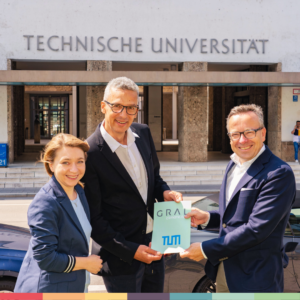Sustainable events: tips and advice for environmentally conscious events

On average, a three-day convention with 1,000 attendees (rough estimate, travel mix) generates as much CO2 as 8-10 persons (average german) does in an entire year. But the good news is that with the right measures, this footprint can be reduced by up to 70%.
As an experienced event agency, #teamgral not only helps to make events more sustainable, but also to professionally fulfill the applicable documentation requirements. In this article, you will learn how you can master both challenges with confidence – and even save costs in some cases.
There are many advantages to sustainable event organisation:
-
- Cost savings: Costs can also be saved through efficient energy consumption, waste reduction and local purchasing.
- Image boost: A sustainable event concept can enhance reputation and attract environmentally conscious participants.
- Regional added value: Small and medium-sized companies in the region are strengthened and promoted.
- Promoting innovation: Organisers of sustainable events promote the development of innovative technologies and methods.
- Role model function: Participants, employees and service providers are sensitised to the topic of sustainability and inspired to act responsibly.
But how can live events be realised in a more environmentally friendly way? Here are some key levers:
-
- Use of energy-efficient technology and renewable energies
- Offering sophisticated mobility concepts for visitors and logistics
- Waste avoidance and recycling-orientated use of materials
- Regional focus and local value chains
- Development of hybrid formats that intelligently combine face-to-face and digital elements
We have compiled a few practical tips for implementation from our daily practice, as we support our event customers in the process from the start of planning to evaluation and documentation afterwards.
Use digitalisation
-
- Replace printed materials with digital media
- Offer event apps for programmes, presentations and networking
- Digital tickets instead of paper printouts
- Online surveys for feedback afterwards
Sustainable catering
-
- Use mainly local and seasonal products
- Use of fair trad products
- Use of compostable materials
- Plan to pass on any leftover food directly
- Avoid single-use plastic, especially for water bottles
Waste management
-
- Set up sufficient recycling stations
- Clearly label waste bins
- Avoid unnecessary gift bags, especially with printed materials
- Use reusable/circular materials for construction and branding
Sustainable mobility
-
- Encourage travelling by public transport
- Offer carpooling platforms
- Offer shuttle services from the railway station
- Offset unavoidable CO2 emissions
These are just a few tips from everyday event practice. Every event is different, every location, every target group has different requirements. Our team will be happy to develop the right strategy and customised measures for your next event!
New documentation requirements from 2024: What else you need to know…
With the new CSR Directive (Corporate Sustainability Reporting Directive), many companies will be subject to extended sustainability reporting obligations from January 2024. This obligation will be introduced gradually:
-
- Since 2024: Large companies that are already required to report (500+ employees)
- From 2025: Companies with more than 250 employees or over €40 million in turnover
- From 2026: Listed SMEs and specialised financial companies
And what does this mean for events? If a company falls under the reporting obligation, the environmental impact of events must also be documented. This includes:
-
- CO2 emissions from participants travelling to the event
- Energy consumption at the event venue
- Waste generation and recycling rates
- Resource consumption for catering and materials
- Social aspects such as working conditions and diversity
#teamgral offers professional expertise for your sustainability documentation
As an experienced event agency, we not only support you with sustainable event design, but also specifically with the fulfilment of the new documentation requirements. In collaboration with the Technical University of Munich, we have developed a specialised documentation tool that implements the complex requirements of the CSR Directive for the event industry.
Our tool enables:
- Precise recording and calculation of all relevant CO2 emissions
- Systematic documentation of resource consumption
- Automated evaluations and comparative analyses
- A sound basis for your CSR reporting
- Concrete recommendations for action to reduce CO2 emissions
The scientific expertise of the Technical University of Munich and our many years of practical experience complement each other perfectly: the tool combines academic precision with practical applicability. This means that we can not only help our customers with pure documentation, but also identify specific optimisation potential for future events.

from left to right Katrin Strauch and Alexander Wolfrum from GRAL and Prof Gunter Friedl, TU Munich
Our team will guide you through the entire process:
Systematic data collection before, during and after the event
- Professional analysis of all relevant sustainability aspects
- Preparation of meaningful reports and documentation
- Development of concrete improvement strategies
- Integration of the results into your CSR reporting
The tool is more than just a documentation instrument – it is the basis for the continuous improvement of your event concepts in terms of sustainability. The database for even more precise analyses and optimisations grows with every documented event.
Conclusion: Sustainability as an opportunity
Sustainable event organisation is no longer an option, but a necessity. Event organisers can lead by example and make an important contribution to climate protection. Every step towards sustainability counts – for our industry and for our planet.
The new documentation requirements may initially appear to be a challenge, but they offer the opportunity to systematically organise events in a more sustainable way. With professional support, you can not only fulfil your reporting obligations, but also benefit from the advantages of sustainable events.
With professional support, you can not only fulfil your reporting obligations, but also benefit from the many advantages of sustainable events.
The path to a sustainable event: how we support you
Developing sustainable event concepts is a process in which every step counts. As an experienced partner, we are here to support you:
- Analysis & consultation: In an initial discussion, we record your specific requirements and work together to identify the most important sustainability potential for your events.
- Customised concept: Based on this, we develop tailor-made proposals for your sustainable events – naturally taking into account the new documentation requirements.
- Comprehensive support: From the initial planning to the final documentation, our experienced team is at your side, supported by our documentation tool developed together with the Technical University of Munich.
Let’s work together to make your events more sustainable. We look forward to talking to you and will be happy to advise you on your individual options.
Contact us at info@gral-gmbh.de – we will get back to you as soon as possible.

Mehr zu GRAL climate.fair und dem Thema Nachhaltigkeit bei #teamgral?

